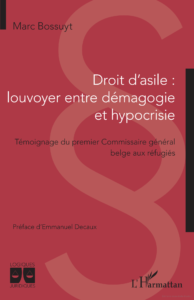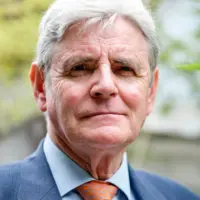I am today speaking with Baron Marc Bossuyt, Emeritus Professor of International Law at the University of Antwerp and Emeritus President of the Constitutional Court of Belgium. For many years, he has been Commissioner General for Refugees and Stateless Persons in Belgium. He also served as Chairperson of the UN Commission on Human Rights, as Chairperson of the UN Sub-Commission on the Promotion and the Protection of Human Rights, and as Vice-Chairperson of the UN Committee on the Elimination of Racial Discrimination.
He is the author of the recent book, “Droit d’asile: louvoyer entre démagogie et hypocrisie. Témoignage du premier Commissaire général belge aux réfugiés (Paris, L’Harmattan, 2023, 435 p.), a timely and relevant publication given the recent developments at the European level.
belge aux réfugiés (Paris, L’Harmattan, 2023, 435 p.), a timely and relevant publication given the recent developments at the European level.
The unity of the European Union is being challenged by asylum and migration crises. According to several experts, almost eighty percent of the European population regard migration and asylum as the most important issue adversely affecting stability and security in Europe. New extreme political forces are emerging, which are jeopardising democracy and the rule of law. There is a concern that the EU is failing to control and manage its asylum and migration regime. CEIPA members and supporters in Europe are very interested to hear qualified opinions and convictions regarding the new policies and reforms the European Union intends to undertake in this field.
 Questions broached on behalf of CEIPA by Peter von Bethlenfalvy, Executive Director of CEIPA in discussion with Baron Marc Bossuyt.
Questions broached on behalf of CEIPA by Peter von Bethlenfalvy, Executive Director of CEIPA in discussion with Baron Marc Bossuyt.
You are one of the few, if not only, international experts who has extensive experience in dealing with policy and legal matters concerning asylum. You have been for many years Commissioner General for Refugees, professor of international law, president of the Belgian Constitutional Court, and human rights expert in the United Nations.
– Is the EU on the right track, with regards to its most recent reform of the Asylum regime in 2023?
The new EU Pact on Migration and Asylum, announced on 23 September 2020, is on the right track, albeit advancing too slowly. A “pre-entry screening of all people crossing the EU’s external borders without permission” and a fast refugee determination procedure are laudable. It should be applied not only in the countries of arrival but also in all other Member States where such persons later apply for asylum. It requires a thorough adaptation of the heavy EU Asylum Procedure Directive (2013). A full asylum procedure, including a jurisdictional intervention and a reception obligation, should not be imposed in case the applicant a) has already received international protection in another EU Member State, b) should be dealt with by another EU Member State in application of the Dublin Regulation or c) has already benefitted from such a procedure in respect of an earlier submitted application. Member States that a) allow for backlogs in their asylum procedures, b) do not ensure speedy procedures and c) do not set up an efficient return policy, should not expect other Member States to remedy those deficiencies by accepting a repartition of asylum seekers.
– You claim that the justice system, notably the judges in Europe, defines the asylum policy in Europe. Can you explain this further please?
The Court of Strasbourg recognizes itself that it provides a broader protection than the Geneva Convention (Chahal, 1996). It has fulfilled an overriding role in shaping asylum policy a) by attributing extraterritorial effects to Article 3 ECHR (Cruz Varas, 1991), b) by lifting the restrictions in case of a danger to the national security or of a conviction of a particular serious crime (Ahmed, 1996), c) by giving a broad interpretation to the membership of a particular social group (Jabari, 2000), d) by declaring its interim measures binding (Mamatkulov and Askarov, 2005), e) by requiring an automatic suspensive effect to appeal procedures (Gebremedhin, 2007), f) by lowering the threshold of Article 3 ECHR, g) by ascribing to it positive obligations and h) by undermining the Dublin Regulation (M.S.S., 2011), i) by prohibiting the return of “boat refugees” to their port of departure (Hirsi Jamaa, 2012) and j) by prescribing a procedure for medical asylum (Paposhvili, 2016). Several judgments of the Court of Luxembourg have also put additional burdens on the asylum policy. Finally, the intervention of national judges in asylum matters, imposed by the EU Asylum Procedure Directive, is continuously increasing the burden of the refugee determination authorities.
– Has the jurisdiction of the European Court of Human Rights, by extending the definition of the right to asylum to different target groups, contributed to the overburdening of the administration of the EU Member States?
Yes. In my opinion, the case law of the Strasbourg Court is the main reason of the overburdening of several EU Member States in matters of asylum. This burden has been increased further by EU directives that on some points went even further than the Strasbourg case law.
– Is it now time to review and adapt the provisions of the Geneva Refugee Convention of 1951 and its Protocol of 1964?
I do not believe that the problems with which the EU Member States in matters of asylum are confronted with, are caused by the Geneva Convention. The main obligation of the Geneva Convention is respect for the principle of non-refoulement. This principle must be respected in all circumstances. The Geneva Convention does not impose any specific asylum procedure, nor reception conditions. The problems are caused essentially by excessive interpretations of the European Convention on Human Rights and by the wide scope of EU directives in the field of asylum.
– Would the Geneva Refugee Convention be timelier and more effective at facing the reality of today’s challenges if it refocused on genuine political refugees and to those seeking international protection, as originally intended?
The Geneva Convention is focused on genuine refugees fearing persecution by one of the grounds mentioned in the Convention. Those that favour the extension of international protection to other persons than refugees in the sense of the Geneva Convention have overlooked that such extension might lead to circumstances which affect the capacity of States to fulfil their obligations.
– Are the EU Member States well enough equipped financially, materially and knowledge wise to deal with the ever-increasing number of asylum requests?
The different EU Member States are confronted with the asylum issues in very different degrees and in very different ways. If the Member States would take the necessary measures to deal with asylum requests in a speedy manner and to effectively repatriate those of whom the asylum request is rejected, the number of such requests would decrease drastically.
– What advice would you give to the EU Member States frequently undermining the provisions of the Schengen Agreement by imposing unilateral border controls on internal EU frontiers?
The Schengen Agreement should not be interpreted as prohibiting any border control whatsoever. Such controls should not be prescribed but, when a Member State feels the need to control the legal status of persons crossing its borders, it should be allowed to do so. The Agreement aims at assuring free movement of persons legally within the Schengen zone. It should not guarantee free border crossing of persons not legally in that zone. Every Member State should be entitled to check, wherever, the legal status of persons entering its territory or residing within it. Moreover, whenever the Dubin regulation cannot be applied in respect of a Member State, the application of the Schengen Agreement should be automatically suspended in respect of that Member State.
– Is the oft-repeated intention of EU governments to quickly return the rejected asylum seekers to their countries of origin or transit country merely a populist fancy, or is it possible?
“The EU and its Member States must act in unity using a wide range of tools to support cooperation with third countries on readmission”. Transforming this intention into reality would be an immense game changer compared with the present situation. Moreover, the EU Return Directive (2008), which is interpreted as complicating rather than facilitating the return of illegal aliens, should be adapted to make a more vigorous return possible. In the next Commission, an EU Commissioner should be entrusted with the task to engage with countries of origin and to streamline the return policy of the EU Member States into a more effective and more efficient one.
– Would, in your opinion, EU managed resettlement and processing centres on the external borders of the EU and in the EU’s neighbouring countries lead to a better management of the asylum claims?
The major problem with the present asylum system is that, once a person requests asylum in the territory of an EU Member State, it is unlikely that that person will ever leave the EU. Albeit extremely difficult, externalising the processing of asylum claims and the reception of asylum seekers should be explored, wherever possible.
– What is to be done as a priority, in your opinion, to prevent the collapse of the asylum system in Europe?
Accelerating the asylum procedure by restricting the jurisdictional appeal procedures to the rejection on the merits of first asylum applications as well as the reception obligation to those applicants and for whom that Member State is responsible.
